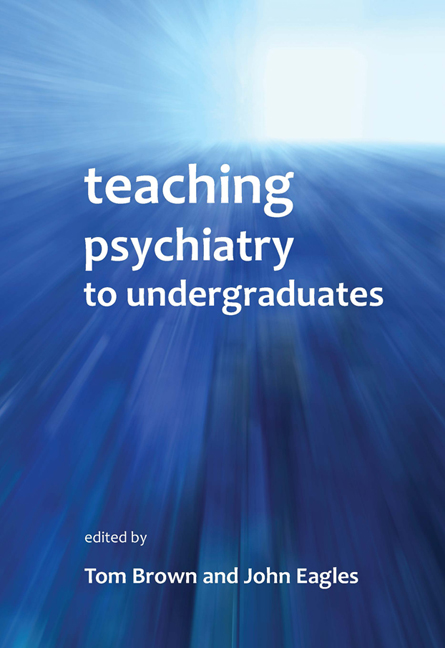Book contents
- Frontmatter
- Contents
- List of figures, tables and boxes
- List of contributors
- Preface
- Foreword
- 1 How do students learn?
- 2 Recent developments in undergraduate medical education
- 3 Undergraduate psychiatry teaching – the core curriculum
- 4 The organisation of undergraduate teaching
- 5 Assessment of undergraduates in psychiatry
- 6 Using computers to teach undergraduate psychiatry
- 7 How to give a lecture
- 8 How to do small-group teaching
- 9 Problem-based learning
- 10 Teaching trainee psychiatrists how to teach medical students: the Southampton model
- 11 Involving trainees in teaching
- 12 Involvement of service users in psychiatric education
- 13 Time-efficient clinical teaching
- 14 Intercalated degrees
- 15 Undergraduate experiences of psychiatry: a student view
- 16 Integration: teaching psychiatry with other specialties
- 17 Teaching the teachers in a cross-cultural setting: the Scotland–Malawi Mental Health Education Project
- 18 International undergraduate teaching
- 19 Teaching with simulated patients and role-play
- 20 Undergraduate medical education and recruitment to psychiatry
- 21 Choosing psychiatry: factors influencing career choice among foundation doctors in Scotland
- 22 Funding of the teaching of medical undergraduates
- 23 Dealing with students in difficulty
- 24 Training medical students to promote good mental health in secondary schools
- 25 Women in medicine
- Index
3 - Undergraduate psychiatry teaching – the core curriculum
- Frontmatter
- Contents
- List of figures, tables and boxes
- List of contributors
- Preface
- Foreword
- 1 How do students learn?
- 2 Recent developments in undergraduate medical education
- 3 Undergraduate psychiatry teaching – the core curriculum
- 4 The organisation of undergraduate teaching
- 5 Assessment of undergraduates in psychiatry
- 6 Using computers to teach undergraduate psychiatry
- 7 How to give a lecture
- 8 How to do small-group teaching
- 9 Problem-based learning
- 10 Teaching trainee psychiatrists how to teach medical students: the Southampton model
- 11 Involving trainees in teaching
- 12 Involvement of service users in psychiatric education
- 13 Time-efficient clinical teaching
- 14 Intercalated degrees
- 15 Undergraduate experiences of psychiatry: a student view
- 16 Integration: teaching psychiatry with other specialties
- 17 Teaching the teachers in a cross-cultural setting: the Scotland–Malawi Mental Health Education Project
- 18 International undergraduate teaching
- 19 Teaching with simulated patients and role-play
- 20 Undergraduate medical education and recruitment to psychiatry
- 21 Choosing psychiatry: factors influencing career choice among foundation doctors in Scotland
- 22 Funding of the teaching of medical undergraduates
- 23 Dealing with students in difficulty
- 24 Training medical students to promote good mental health in secondary schools
- 25 Women in medicine
- Index
Summary
Introduction
The word ‘curriculum’ derives from a Latin word meaning a running, and can be translated as a contest in running; the Latin curro means to run or hasten. Thus, there is the implication that a curriculum is to hasten individuals to a particular endpoint. Whereas a century ago some students may have taken a leisurely period of years to reach qualification, in this century there is a definite sense of purpose among teachers and students alike to reach the conclusion of the undergraduate medical course with the production of a well rounded medical graduate. It is important that the teaching in our medical schools assists this process, encourages the learning of relevant knowledge and clinical skills and encourages appropriate attitudes. A well-designed curriculum provides the framework upon which this may be achieved.
We should distinguish between syllabus and curriculum. In current educational taxonomy, the term syllabus relates to the content of what is taught on a particular course. The term curriculum has a wider meaning and encompasses not only course content but also methods of learning and assessment, as well as the organisation and integration of these. Often, however, the term is used more loosely. To some extent, therefore, the word curriculum could be applied to describe the entire content of this book.
A curriculum relating solely to the teaching of psychiatry to undergraduate medical students could also be seen as a contradiction in terms, as a true curriculum will integrate psychiatry with all the other medical disciplines to be mastered. However, this must be the province of each individual medical school, as the approach to integration within curricula depends very much on the ethos and resources available within each school.
Drivers of the development of medical school curricula (see also Chapter 2)
The development of more formal curricula in medical schools seems to have begun in the early 19th century. For example, the website of the University of Glasgow, in describing the history of the Glasgow medical school, states that: In 1801, the University Senate appointed a committee to inquire into the existing regulations for medical degrees and the first definite curriculum was established in 1802.
- Type
- Chapter
- Information
- Teaching Psychiatry to Undergraduates , pp. 26 - 37Publisher: Royal College of PsychiatristsPrint publication year: 2011

